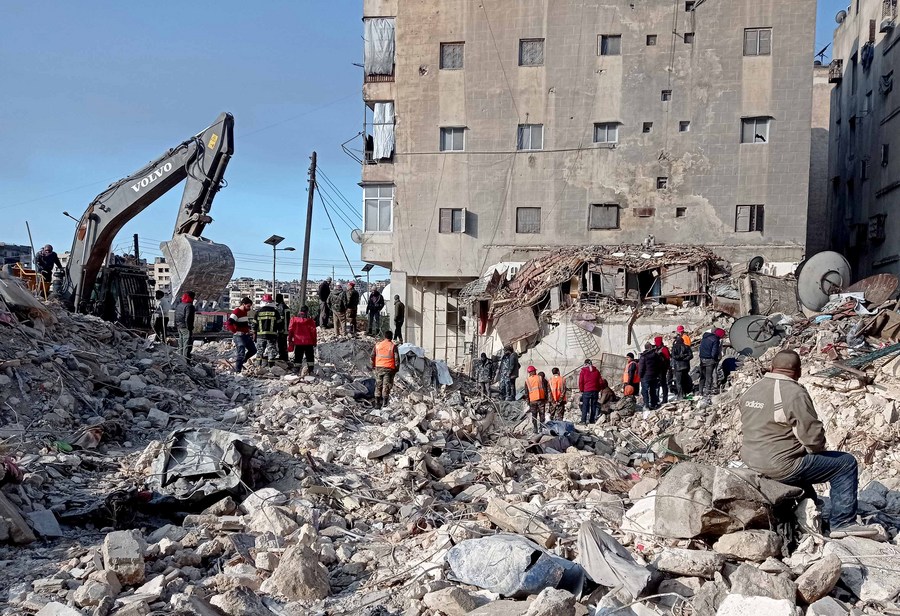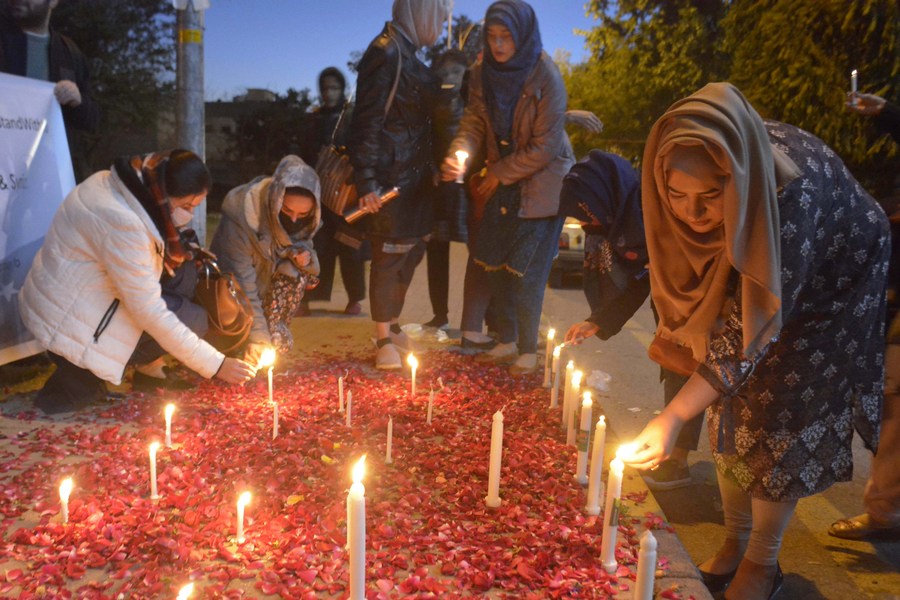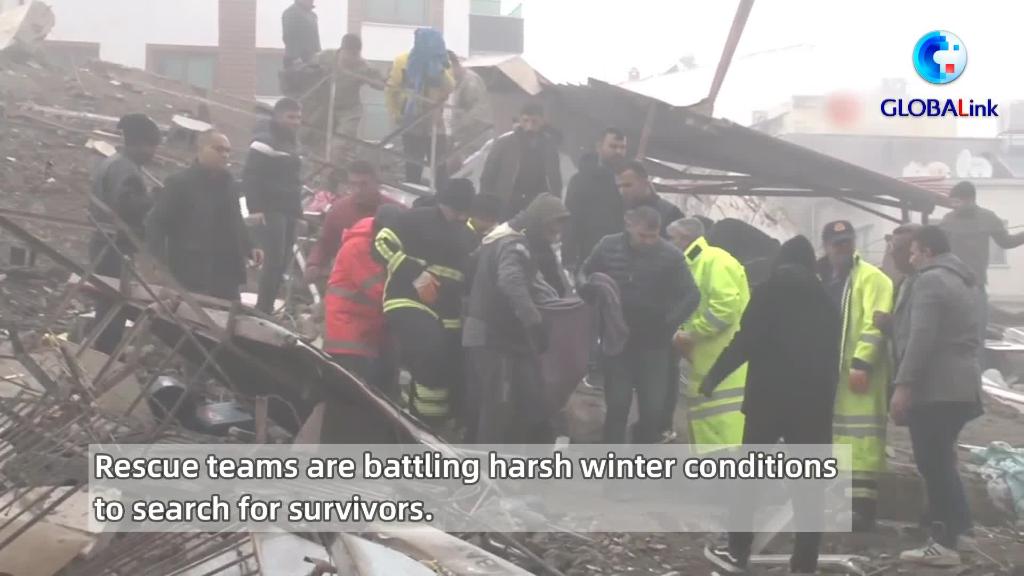
People search for survivors among the rubble of a building destroyed in a powerful earthquake in the al-Masharqa neighborhood of Aleppo city, northern Syria, on Feb. 7, 2023. (Str/Xinhua)
Sanctions have been a main U.S. tactic toward Syria ever since the latter was listed as a state sponsor of terrorism in 1979. Since the start of the Syrian civil war in 2011, the United States and its Western allies have imposed a number of economic sanctions and restrictions that denied Syrians the means to pursue growth as well as access to daily necessities.
DAMASCUS, Feb. 8 (Xinhua) -- Syria on Tuesday lambasted the United States for blocking humanitarian relief work in Syria, a day after massive earthquakes rocked the northern part of the country and vast swathes of its neighbor Türkiye.
In a statement, the Syrian Foreign Ministry said that Syrians, while dealing with the earthquake catastrophe, are digging among rubbles with bare hands or using the simplest tools, as the equipment for removing the rubbles has been banned by the United States.
Sanctions have been a main U.S. tactic toward Syria ever since the latter was listed as a state sponsor of terrorism in 1979. Since the start of the Syrian civil war in 2011, the United States and its Western allies have imposed a number of economic sanctions and restrictions that denied Syrians the means to pursue growth as well as access to daily necessities. U.S. sanctions intensified with the passing of the Caesar Act in 2019.
CALL FOR END OF U.S. SANCTIONS
Monday's strong earthquakes drained the already limited resources of Syria, where at least 2,470 were killed and 4,650 injured, according to data released by authorities and rescuers.
The city of Aleppo in northern Syria was among the hardest hit in the quake, with debris still constantly falling in the aftermath of Monday's earthquakes. And for lack of tools, some rescuers to dig through the rubble with bare hands in search of survivors in the snow and rain, Xinhua reporters witnessed.
Local residents are railing against the United States for retaining the economic sanctions when Syria desperately needs help from the international community.
Aisha al-Hilu, a school teacher, fled home with the kids after the earthquakes. All of their belongings were buried under the rubble.
She blasted the U.S. sanctions, which have cut off Syria's economic and financial ties with the rest of the world and impeded the country's access to quake relief supplies.
"These sanctions 'punished' us, but we didn't do anything. Shame on them ... They must remove these sanctions," she said.
Prior to the quakes, Syria was already hurt by a new round of U.S. sanctions. On Jan. 16, the Syrian Foreign Ministry condemned in a statement the United States for imposing new sanctions that hinder Syria's import of medical equipment and spare parts through "inhuman measures."
At a press conference held Tuesday in the Syrian capital Damascus, Syrian Arab Red Crescent (SARC) President Khaled Hboubati called for lifting the U.S. and Western sanctions on Syria to facilitate much-needed relief efforts.
In an interview with the semi-official Mehr news agency on Monday, Iranian Foreign Ministry spokesperson Nasser Kanaani called on countries to pressure the United States into lifting the sanctions on Syria and the siege of the country to enable the delivery of international aid.
"The people of northern Syria are really suffering. Sanctions are stifling international relief and medical supplies. Thousands of deaths in Syria are preventable; earthquake relief should pause sanctions," tweeted Khaled Beydoun, associate professor of law at U.S.-based Wayne State University.
"Western countries don't need to send anything. Just remove lethal sanctions on Syria," tweeted Sharmine Narwani, a commentator and analyst of Middle East geopolitics and former senior associate at St. Antony's College, Oxford University.

People light candles during a candlelight vigil for the victims of earthquakes in Türkiye and Syria, in Islamabad, capital of Pakistan on Feb. 6, 2023. (Xinhua/Ahmad Kamal)
OTHER U.S. WRONGDOINGS
After Monday's earthquakes, Washington has ruled out the possibility of dealing directly with Syrian President Bashar al-Assad in quake relief efforts.
U.S. State Department Spokesman Ned Price on Monday told reporters that the United States will send aid to Syria through non-governmental organisations (NGOs) without engaging with the Syrian government, which it does not recognize as legitimate.
The accusation that Syria is a sponsor of terrorism is "an old-school pretext" that the United States often uses to justify its intervention in other countries, said Maher Ihsan, a journalist and political expert.
"Look at the situation now, the United States is controlling key gas and oil fields in oil-rich areas in Syria as well as key agricultural areas ... the United States didn't come here to help, but to take advantage of the situation and impose their own will," Ihsan told Xinhua in a previous interview.
After its direct military interventions in Syria in 2014, the United States has sent troops to oil-rich regions of Syria, including the northeastern province of Hasakah and the eastern province of Deir al-Zour.
Damascus has long blamed U.S. forces for stealing Syrian oil and other resources. Videos footages showing U.S. troops using tankers to transport Syrian oil to U.S. military bases in Iraq have been widely circulated online.
In August last year, the Syrian oil ministry accused the United States of stealing 83 percent of Syria's oil output in the first half of 2022. The average daily output of Syrian oil in the first half of 2022 was 80,300 barrels, while the U.S. forces and their "mercenaries" were stealing an average of 66,000 barrels a day, a ministry statement showed.
By plundering a significant percentage of Syria's oil supply, the United States has not only robbed Syria of its valuable resources direly needed for economic recovery and social construction, but also deprived average Syrians of crucial daily necessities in winter. Syrians have to endure inadequate heating and lengthy power outages during the chilly winter.
"The U.S. role in Syria has been destructive, to say the least," said Osama Danura, a Syrian political expert and former member of the Syrian government delegation to the Syria peace talks in Geneva. "The economic circle in Syria has been damaged by such unilateral measures." ■












